
Eugene Wesley Roddenberry Sr. was an American television screenwriter, producer, and creator of Star Trek: The Original Series, its sequel spin-off series Star Trek: The Animated Series, and Star Trek: The Next Generation. Born in El Paso, Texas, Roddenberry grew up in Los Angeles, where his father was a police officer. Roddenberry flew 89 combat missions in the Army Air Forces during World War II and worked as a commercial pilot after the war. Later, he followed in his father's footsteps and joined the Los Angeles Police Department, when he also began to write scripts for television.

Star Trek: The Animated Series (TAS) is an American animated science fiction television series created by Gene Roddenberry. It originally aired simply under the title Star Trek, subtitled Created by Gene Roddenberry, on Saturday mornings from September 8, 1973 to October 12, 1974 on NBC, spanning 22 episodes over two seasons. The second series in the Star Trek franchise, it features mostly the same characters as Star Trek: The Original Series. Set in the 23rd century, the series follows the further adventures of the Starship USS Enterprise as it explores the galaxy.
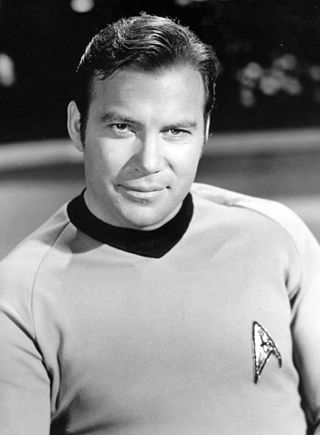
James Tiberius Kirk, commonly known as James T. Kirk or Captain Kirk, is a fictional character in the Star Trek media franchise. Originally played by Canadian actor William Shatner, Kirk first appeared in Star Trek serving aboard the starship USS Enterprise as captain. Kirk leads his crew as they explore new worlds, new civilizations, and "boldly go where no man has gone before". Often, the characters of Spock and Leonard "Bones" McCoy act as his logical and emotional sounding boards, respectively. Kirk has also been portrayed in numerous films, books, comics, webisodes, and video games.

Star Trek: The Motion Picture is a 1979 American science fiction film directed by Robert Wise and based on the television series Star Trek created by Gene Roddenberry, who also served as its producer. It is the first installment in the Star Trek film series, and stars the cast of the original television series. In the film, set in the 2270s, a mysterious and immensely powerful alien cloud known as V'Ger approaches Earth, destroying everything in its path. Admiral James T. Kirk assumes command of the recently refitted Starship USS Enterprise, to lead it on a mission to save the planet and determine V'Ger's origins.

David Gerrold is an American science fiction screenwriter and novelist. He wrote the script for the original Star Trek episode "The Trouble with Tribbles", created the Sleestak race on the TV series Land of the Lost, and wrote the novelette "The Martian Child", which won both Hugo and Nebula Awards, and was adapted into a 2007 film starring John Cusack.
"The City on the Edge of Forever" is the twenty-eighth and penultimate episode of the first season of the American science fiction television series Star Trek. It was written by Harlan Ellison; contributors to and/or editors of the script included Steven W. Carabatsos, D. C. Fontana and Gene L. Coon. Gene Roddenberry made the final re-write. The episode was directed by Joseph Pevney and first aired on NBC on April 6, 1967, with a repeat broadcast on August 31, 1967.

Christine Chapel is a fictional character who appears in all three seasons of the American science fiction television series Star Trek: The Original Series, as well as Star Trek: The Animated Series and the films Star Trek: The Motion Picture and Star Trek IV: The Voyage Home. Portrayed by Majel Barrett, she was the ship's nurse on board the Starfleet starship USS Enterprise. A younger version of Chapel appears in the 2022 series Star Trek: Strange New Worlds, portrayed by Jess Bush.
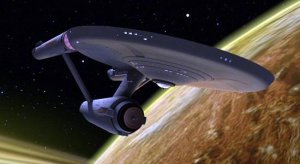
USS Enterprise (NCC-1701) is a starship in the Star Trek media franchise. It is the main setting of the original Star Trek television series (1966–69), and it is depicted in films, other television series, spin-off fiction, products, and fan-created media. Under the command of Captain James T. Kirk, the Enterprise carries its crew on a mission "to explore strange, new worlds; to seek out new life and new civilizations; to boldly go where no man has gone before." Star Trek: Strange New Worlds (2022–23) depicts the Enterprise under the command of Kirk's predecessor, Captain Christopher Pike.

Janice Rand is a fictional character in the American science fiction television series Star Trek: The Original Series during its first season, as well as three of the Star Trek films. She is the Captain's yeoman on board the USS Enterprise (NCC-1701), and first appeared in the episode "The Man Trap". She had significant roles in the episodes "The Enemy Within", where she fights off an evil version of Captain James T. Kirk; "Charlie X" where a young man with god-like powers falls in love with her; and "Miri" where she is infected with a deadly disease while on an away mission and is kidnapped by jealous children.
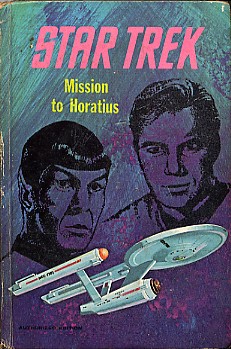
Mission to Horatius is a novel based on the American science fiction television series Star Trek: The Original Series. It was published in 1968 by Whitman, and was the first original novel based on the series; the first novel for adult audiences, Spock Must Die!, was not published until February 1970. Mission to Horatius details the adventures of the crew of the U.S.S. Enterprise investigating where a distress signal had originated, resulting in them engaging with several different human colonies.
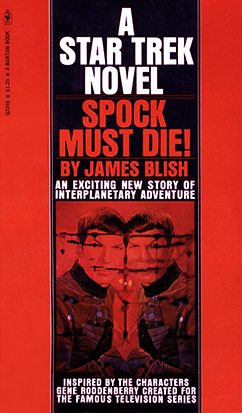
Spock Must Die! is an American science fiction novel written by James Blish, published February 1970 by Bantam Books. It was the first original novel based on the Star Trek television series intended for adult readers. It was preceded by a tie-in comic book line published by Gold Key and the novel Mission to Horatius by Mack Reynolds, all intended for younger readers.

Yesterday's Son is a science fiction novel by American writer A. C. Crispin set in the fictional Star Trek Universe. It describes the events surrounding Spock's discovery that he has a son. Yesterday's Son and its sequel, Time for Yesterday, make up A. C. Crispin's "Yesterday Saga".
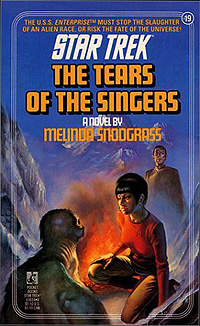
The Tears of the Singers is a science fiction novel by American writer Melinda M. Snodgrass, part of the Star Trek: The Original Series franchise. It was her first and only Star Trek novel, which led to Snodgrass writing for Star Trek: The Next Generation. Writer Victor Milán was also involved in the initial discussion of the plot for the novel.
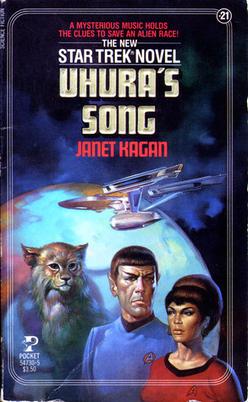
Uhura's Song is a Star Trek: The Original Series novel written by Janet Kagan published in 1985. Kagan was asked to produce an outline by editor David G. Hartwell, after he read the manuscript of her novel Hellspark. She was unfamiliar with Star Trek and needed to research the series whilst writing Uhura's Song. She subsequently proposed two sequels, but they went unwritten as they featured original characters introduced in Uhura's Song.

Killing Time is a science fiction novel by American writer Della Van Hise. Part of the Star Trek: The Original Series franchise, it was published by Pocket Books in 1985. The original manuscript had Kirk/Spock slash fiction elements, and these were requested to be removed by Paramount. However, they were not removed, and 250,000 copies were printed. These romantic undertones between Spock and James T. Kirk were brought to the attention of the office of the creator of Star Trek, Gene Roddenberry, who made Pocket Books recall the first edition. This edition subsequently became a collector's item, with more than fifty changes made to a revised version.

The Pandora Principle is a science fiction novel by American writer Carolyn Clowes, part of the Star Trek: The Original Series. It features the origin story of Saavik, and how she came to know Spock.
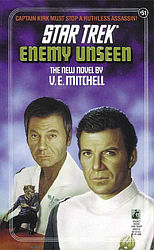
Enemy Unseen is a Star Trek: The Original Series novel written by V.E. Mitchell.
Star Trek: Planet of the Titans, also known as Star Trek: Planet of Titans, is an unproduced film based on Star Trek, which reached the script and design phases of pre-production. Following the success of Star Trek in broadcast syndication during the early 1970s and the popularity of the series at science-fiction conventions, Paramount Studios made several attempts to produce a feature film based upon the series. In 1975, Star Trek: The God Thing was proposed by franchise creator Gene Roddenberry but was not picked up by the studio.

Star Trek: The God Thing is an unproduced film script written by Star Trek series creator Gene Roddenberry. Following the success of Star Trek in broadcast syndication during the early 1970s, Paramount Pictures sought to produce a feature film based on the property. The film's plot follows the Enterprise crew after the events of The Original Series: when an alien entity declares itself God and begins travel to Earth, Admiral James T. Kirk reunites the crew, who send it back to its own dimension. Roddenberry completed the story on June 30, 1976, but Paramount rejected the script for reasons Roddenberry attributed to the religious views of company executives. Story elements were used in Star Trek V: The Final Frontier.

















